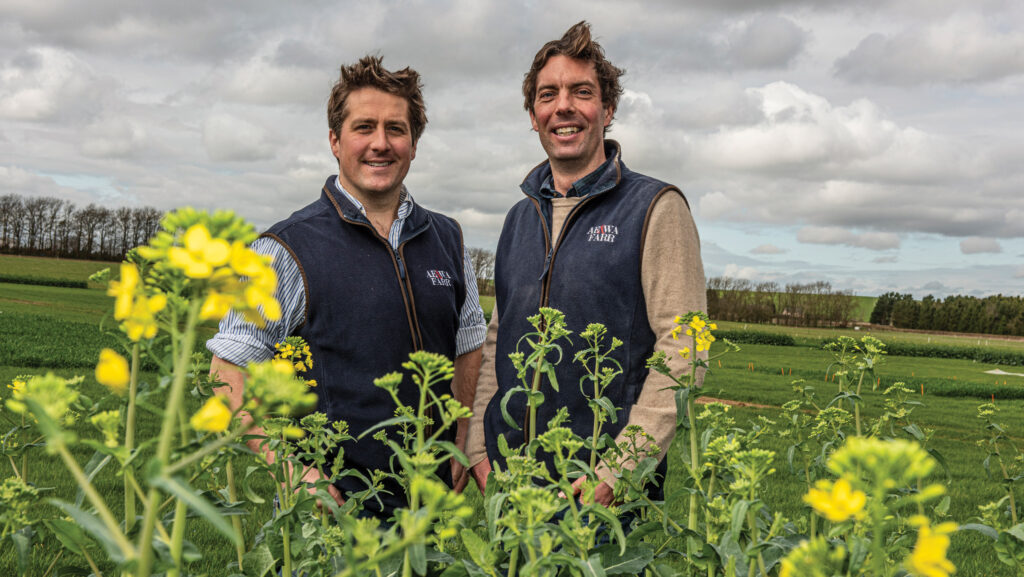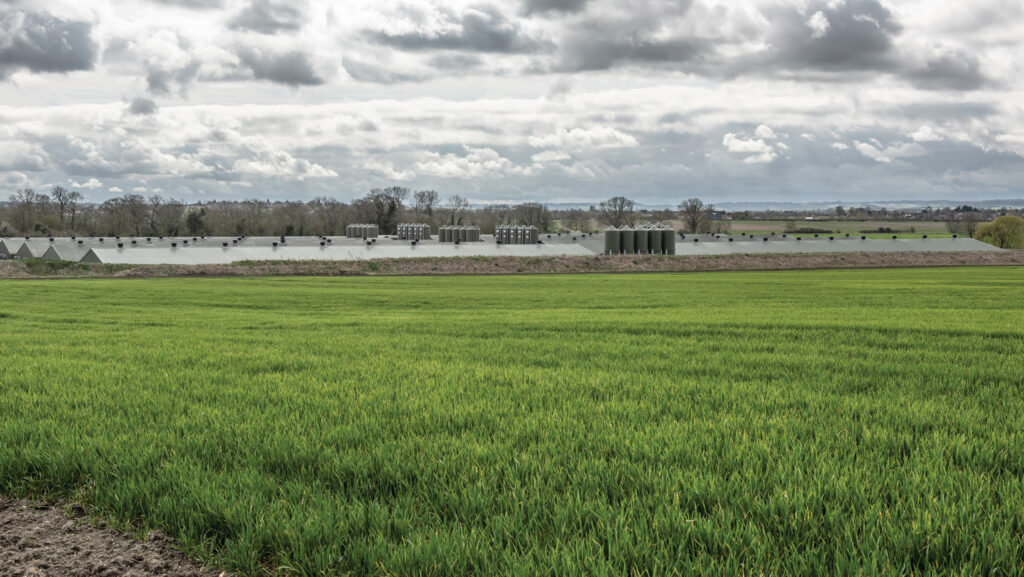New hosts revealed for new-look Cereals event
 New Creals hosts Ed Wainwright-Lee and Alex Farr © Phil Weedon
New Creals hosts Ed Wainwright-Lee and Alex Farr © Phil Weedon The prospect of opening the farm gates to 20,000 visitors at this year’s Cereals event in June holds no fear for new hosts Alex Farr and Ed Wainwright-Lee, who have been running festivals on their farm for the past decade.
The family partnership behind AE & WA Farr at Newnham in Hertfordshire is looking forward to holding the two-day event, when visitors will be able to catch up with the latest developments in arable farming.
The 910ha arable and poultry farm is spread over three sites in Hertfordshire and Bedfordshire. The business combines farming activities with a commercial and residential property portfolio and renewable energy production as well as its events arm.
See also: Catch up with the latest Cereals news
Alex explains: “Having a managed and structured site with a licensed area on a working, family-run farm makes it the perfect location for the event, with good transport links adding to its appeal.
“We have had festivals and concerts here and we also have a dedicated wedding site. So we are no strangers to what it involves and how to get people on and off the site.”
The cousins, along with their parents, recognise that Newnham Manor Farm, near Baldock, is staging the event at a pivotal time for the industry and they are encouraging everyone to attend.
“Like all farming businesses, we are always looking at diversification opportunities that allow us to make the best use of what we have,” Alex says.

AE & WA Farr poultry plant © Phil Weedon
Farm changes
The farm has had some significant changes in the past eight years, both to make room for the new generation and to future-proof the business against the loss of the Basic Payment Scheme.
Nine years ago, potatoes were dropped from the rotation and eight years ago the business added a purpose-built poultry unit, which now produces 400,000 broilers per year.
This has added some circularity to the business, with chicken muck applied to the arable land to improve soil health and fertility.
Integration of poultry manure has since reduced reliance on artificial fertiliser, replacing the need for 70kg/ha of nitrogen.
Winter wheat, oilseed rape and sugar beet are the main crops being grown at the farm this year.
Cover crops are grown ahead of sugar beet and a companion crop of white clover and buckwheat is drilled alongside the oilseed rape.
A Mid Tier Countryside Stewardship scheme has been in place for three years and a Sustainable Farming Incentive (SFI) agreement has just started.
About 60ha is in stewardship options, Ed says. “That includes wild bird covers, field margins and herbal leys.
Where we are implementing the SFI, we are doing soils and hedgerow actions, as well as cover crops, and integrating some rotational options.”
In addition, 3ha of new woodland is being created and some 6,000m of new hedges have been planted in the past three years.
Cropping
Food production remains the priority for Alex and Ed who work closely with Agrii agronomist Paul Foster. The winter wheat is grown for milling and the sugar beet, which averages 90t/ha, goes to the Bury St Edmunds factory.
Oilseed rape has kept its place in the rotation, but spring barley – previously a mainstay – has been replaced.
“We weren’t able to achieve the malting specification once we started using chicken muck,” Ed explains.
Pulse crops have been and gone, although Alex and Ed remain open-minded about new crop opportunities and how they might work for the farm.
Sheep – which belong to a member of the farm team – are used to graze off the herbal leys and provide fertility.
The farm has reduced soil cultivations and now runs a min-till system, using direct-drilling with its Weaving drill where possible, or working to a maximum depth of 6cm with a Vaderstad Carrier.
Ploughing is used after sugar beet, enabling a late-drilled wheat crop. Despite the prolonged wet winter, a December drilling window allowed this year’s late wheat to be established and it is looking good, Alex and Ed report.
“We are lucky to be on free-draining soils, so it is very unusual to see standing water on the farm.”
Property portfolio
The business lets and manages a broad range of commercial units, office space and residential property, with development continuing to meet local demand.
Woodchip biomass boilers run the heating and hot water for most of the properties, which benefit from being just one-and-a-half miles from the A1 and close to popular towns.
The large heating demand for the poultry enterprise is supplied by two biomass boilers running on waste wood, while a 250kW PV system mounted on shed roofs means that it is 30% self-sufficient in electricity.
New income streams and carbon queries
This year’s Cereals host farmers, Alex Farr and Ed Wainwright-Lee, say they are “watching and waiting” when it comes to selling carbon and biodiversity or exploiting the farm’s natural capital.
Baselining has been carried out, says Ed. He has had soil organic matter testing done and carbon footprinting completed for the poultry enterprise.
“We have taken the opportunity to understand more about where we are in terms of emissions and how we might improve.”
Otherwise, Ed stresses that any developments in these new and fledgling markets must suit the business and the system that they run. “It’s about fitting them around what we are doing and not the other way round.”
There are still things to learn about privately funded schemes, he adds, and many of them involve taking a long-term approach.
Farm facts box: AE & WA Farr
- 900ha based at Newnham, Hertfordshire
- 480ha winter wheat for milling
- 130ha oilseed rape – hybrid and conventional
- 120ha sugar beet
- 60ha stewardship
- 36ha venue/site plus 20ha car parking
- Woodland, including wedding venue
- Extensive property portfolio
- 400,000-bird poultry enterprise
- Renewable energy
Visit Cereals 2024
This year’s Cereals event will welcome visitors to a new site, at Bygrave Woods, Newnham Farm in Hertfordshire, on 11-12 June, alongside a new co-hosted event, DirectDriller@Cereals.
As ever, Cereals will showcase the latest developments in agronomy, arable-related machinery, technology innovations and business advice, with a focus on innovation and efficiencies.
The two-day event will feature more than 450 exhibitors and more than 200 live demonstrations. Visitors can see several hundred individual crop plots on display and make the most out of a packed seminar programme.
A new addition to this year’s event, is the Seed to Shelf seminar stage, which will trace the arable supply chain from seed to retail shelf.
Seminars will feature a range of speakers, including farmers, plant breeders, agronomists and retailers, with subjects including regenerative agriculture and the future of crop breeding, the economics of using a contractor and “green premiums”.
To register for tickets and find out more about the event – including the co-hosted DirectDriller@Cereals event – visit www.cerealsevent.co.uk.

